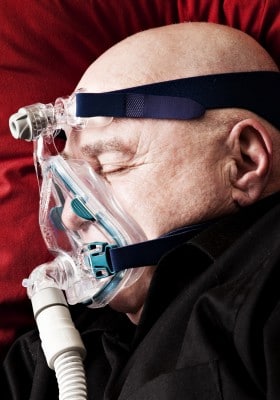CPAP (Continuous Positive Airway Pressure) is considered the gold standard of treatment for obstructive sleep apnoea. It has been proven to reduce the risk of heart attack, stroke, and other complications of sleep apnoea. Unfortunately, it fails up to 80% of people who try it. Why? CPAP is inconvenient and uncomfortable for many people, so they just don’t use it.
We’re not sure why people don’t use CPAP, but here are some possibilities that may predict whether you will be able to use CPAP or not.
Your Sleep Apnoea Symptoms and Relief
 Probably the strongest predictor of whether you will keep up CPAP treatment is whether you have significant sleep apnoea symptoms that are making an impact on your daily life, and whether CPAP removes those symptoms. Symptoms such as daytime sleepiness, headaches, and other tangible symptoms make the biggest difference.
Probably the strongest predictor of whether you will keep up CPAP treatment is whether you have significant sleep apnoea symptoms that are making an impact on your daily life, and whether CPAP removes those symptoms. Symptoms such as daytime sleepiness, headaches, and other tangible symptoms make the biggest difference.
What doesn’t make a difference is the actual severity of your sleep apnoea. Many people who are facing serious health risks don’t have severe symptoms, and these people don’t comply with CPAP very well.
Psychological Factors
After your symptoms, there are many psychological and sociological factors that may contribute to your ability to comply with CPAP treatment. Factors that may decrease your compliance include:
- Low perception of benefit (hence the role of visible symptoms above)
- If someone told you to get treatment
- Sleeping alone
- Low socioeconomic status
- Anxiety or depression
- Poor early CPAP experience
What doesn’t seem to affect your compliance is whether you are responsible about taking other medications. CPAP is something different, and even people who are responsible about other medications may have poor compliance rates.
Side Effects
Another predictor of whether you will comply with CPAP is whether you suffer side effects related to the pump or mask. If you experience:
- Inconvenience
- Poor mask fit
- Skin irritation and breakouts
- Dry airways
- Susceptibility to the noise of the pump
- Claustrophobic feelings
These side effects may impact up to 70% of CPAP users, but don’t always lead to poor compliance.
If CPAP Isn’t Right for You
If you don’t think you’ll be able to comply with using CPAP for the amount of time necessary to get benefit, or if you’ve tried and it isn’t working out, don’t despair. There are other CPAP alternatives. in the Baulkham Hills area.
To learn more about sleep apnoea treatment options beyond CPAP, please contact My Hills Dentist in the Baulkham Hills area of Sydney.

